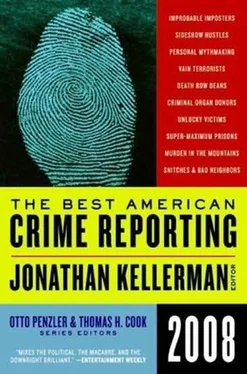Minutes later the Chinese police marched the first of several groups of refugees they’d captured into camp. One group included about a dozen kids.
“The children were in single file, about six feet away from me,” Steve Lawes, a British climber, later told the International Campaign for Tibet. “They didn’t see us-they weren’t looking around the way kids normally would; they were too frightened. By that time advanced base camp was crawling with soldiers. They had pretty much taken over, and the atmosphere was intimidating. We were doing our best not to do anything that might spark off more violence.”
The soldiers marched the kids into a big green tent flying a Chinese flag, a tent that was off-limits to foreign climbers. About an hour later a PAP soldier entered the camp with an injured Tibetan on his back. The Tibetan appeared to have been shot in the leg, but the soldier dumped him on the snow like a sack of grain. In all, nearly 30 refugees were brought to the green tent, then herded off to a detention center. There, according to testimony given to the ICT, several were severely beaten.
The climbers were appalled but felt helpless to intervene. A few of the PAP soldiers were actually friendly to the climbers; in their late teens, the soldiers took breaks in camp, lit cigarettes, and carried on as if everything that had just happened was routine, a morning’s work.
Four hours later a Tibetan kitchen boy came running to Matei. Someone was hiding in the toilet tent, he said. Matei went to investigate. Hunkered in the latrine, his hands shaking, was a man called Choedron, a poor farmer in his 30s. He had tried to bury himself in rocks, pathetically using a toilet paper bag to cover himself. As the tent zip ripped up, he nearly retched from fright; he feared that a Chinese prison cell, torture, and shame awaited him. Instead, he was confronted with Matei, whose red goatee and shaved head lend him the look of a death metal bassist. Unable to speak Tibetan, Matei repeated the one thing Choedron said: “Dalai Lama.” Choedron put his hands together in veneration. They understood each other.
Matei acted quickly. First he tried to convince the Nepali base camp manager to help the terrified refugee. He refused. “The Chinese will shoot us if we are caught,” he said. “It is much too dangerous.” Over the manager’s protests, Matei took Choedron from the tent and fed him. Starving after nearly two weeks in the snow, he devoured any food set in front of him. Afterward Matei gave him all of his spare clothes and then hid him in his tent.
As darkness fell Matei wanted to videotape Kelsang’s body as evidence of the murder. But he had noticed that the PAP soldiers had night-vision equipment, and he feared being shot in the dark.
By 2:30 AM Choedron was ready to leave. The stress of hiding Choedron, along with the tape he had of the shootings, had turned Matei into a nervous wreck. With the pass below them glistening in the moonlight, they looked at each other awkwardly. Matei clapped Choedron on his back, and said, in Romanian, “God will be with you.”
Out in the night a group of refugees was hiding in a snow hole, waiting for their turn to run under the protective cloak of darkness. A few crept to Kelsang’s body. One nun crouched by her side, lifted her arm, and saw congealed blood, now frozen.
The next day a small detachment of Chinese soldiers and officials returned to Kelsang’s body. There they posed for pictures, with the body in the foreground and Cho Oyu in the background. According to one eyewitness account, they wrapped the corpse of the 17-year-old nun-to-be in a red blanket or body bag and hurled it into a crevasse. It is believed that later they returned to take the body into custody.
AMID DOUBTS THAT he should be doing more to help the captive Tibetans, Benitez had reflexively returned to his clients and their summit preparations. “My first responsibility is to my team,” he recalls thinking. Besides, focusing on what he knew helped calm his nerves. It was a decision, he says today, that “I’ll regret the rest of my life.”
Matei, watching as Benitez and other teams carried on to the summit, was disgusted. “No one was saying, This is bad,” he says. “Everyone was just like, Where’s my coffee? Let’s have some tea and get ready.”
Benitez didn’t make the summit. Nor did two of his clients-one was suffering from symptoms of altitude sickness; the other was simply exhausted, mentally and physically, after the events in base camp. One turned back on the first day, returning with one of Benitez’s Sherpas. The other lasted a second day before Benitez took him down after assessing his condition.
“On that climb I’ve never had such heavy feet,” Benitez says. “The summit push is meant to be where all your hard work pays off; it was the final fight of the mountain, but at that point it felt like I didn’t want to go to the top. My heart wasn’t in it. We were fighting to reach the top, but we felt that we were fighting for the wrong thing. All we had were questions about what we had seen. We had no fight in us.”
When Benitez returned to camp he was surprised to learn no one had reported the shooting to anyone outside the camp. “I really thought all the climbers would be standing up for human rights,” he says.
Instead, climbers were being urged by at least two guides not to tell anyone what they had seen. Renowned Slovenian climber Pavle Kozjek, 48, who witnessed the aftermath of the shooting, said, “For many people in the base camp the most important thing was to be able to come back again. They decided not to tell what had happened because of this.” And, he said, “I heard some expedition leaders forced their clients not to report these events.”
But Benitez couldn’t live with himself. He sent an e-mail to ExplorersWeb.com, an expedition website, just after 7 AM on October 2. The header of the e-mail read: “story not being told here in tibet.” He detailed the shooting, asked for his name to be kept out of it, and ended by emphasizing the need to “tell the world about this little corner of the planet, where people are dying attempting to reach for a better life.”
A few hours later Kate Saunders, from the International Campaign for Tibet, alerted governments worldwide, which took the issue up with China. “Over those few days I was trying to speak to as many climbers up there as possible,” she says. “Luis was the only climber who would speak to us from Cho Oyu, inside Tibet.”
Meanwhile, as Benitez was ordering yaks and packing for the trail down, he confided to his assistant guide, Paul Rogers, that he’d sent the note. Immediately afterward, Benitez claims, Rogers “did a Judas.” (Rogers declined to comment.)
According to Benitez, Rogers went straight to Russell Brice, owner and operator of Himalayan Experience, the biggest commercial climbing operator on the north side of Everest. Brice, hero of Discovery Channel’s Everest: Beyond the Limit , dropped the sage, avuncular manner of his television persona and became enraged. Brice works closely with the Chinese, depending upon them for climbing permits to run his business; all told, he pulls in, by some estimates, as much as $10 million a year. “And that’s a low estimate,” says Tom Sjogren, who runs ExplorersWeb.com with his wife Tina and is a known critic of Brice. “Just about any business on Cho Oyu or Everest somehow has Russell Brice involved in it.”
Brice, with Rogers at his side, stormed down the hill at around 3 PM. “Paul told me you sent an e-mail to ExplorersWeb,” Brice accused Benitez. “Are you trying to get us kicked out of the country?” He began jabbing his finger at the younger guide. “Are you fucking crazy?”
“This ‘free Tibet’ thing is bullshit,” Rogers jumped in. “The Chinese have done more for Tibet than you know. These people they shot at were human traffickers. It’s a girl-smuggling ring to Mumbai. The only reason you want to tell everyone is that you want to be famous.”
Читать дальше












